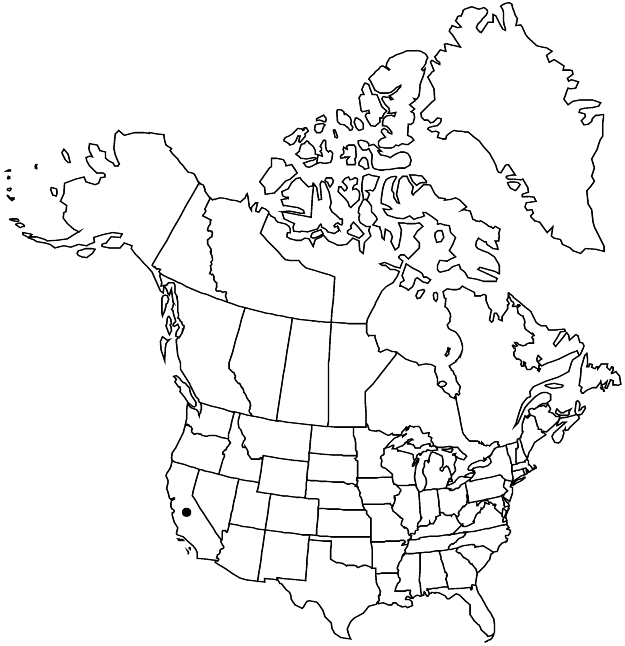Difference between revisions of "Eriogonum butterworthianum"
Leafl. W. Bot. 9: 153. 1961.
FNA>Volume Importer |
FNA>Volume Importer |
||
| Line 25: | Line 25: | ||
|distribution=Calif. | |distribution=Calif. | ||
|discussion=<p>Of conservation concern.</p><!-- | |discussion=<p>Of conservation concern.</p><!-- | ||
| − | --><p>Eriogonum butterworthianum is a rare and localized species that grows in the cracks of Vaqueros sandstone near The Indians in the Santa Lucia Range of Monterey County. It is considered a “sensitive species” by the U.S. Forest Service. Its relationship to other species in subg. Eucycla is uncertain. Butterworth’s wild buckwheat would make an elegant addition to the garden. Given its rarity, great care must be taken even in collecting seeds.</p> | + | --><p><i>Eriogonum butterworthianum</i> is a rare and localized species that grows in the cracks of Vaqueros sandstone near The Indians in the Santa Lucia Range of Monterey County. It is considered a “sensitive species” by the U.S. Forest Service. Its relationship to other species in subg. Eucycla is uncertain. Butterworth’s wild buckwheat would make an elegant addition to the garden. Given its rarity, great care must be taken even in collecting seeds.</p> |
|tables= | |tables= | ||
|references= | |references= | ||
| Line 49: | Line 49: | ||
|publication year=1961 | |publication year=1961 | ||
|special status= | |special status= | ||
| − | |source xml=https://jpend@bitbucket.org/aafc-mbb/fna-data-curation.git/src/ | + | |source xml=https://jpend@bitbucket.org/aafc-mbb/fna-data-curation.git/src/8f726806613d60c220dc4493de13607dd3150896/coarse_grained_fna_xml/V5/V5_579.xml |
|subfamily=Polygonaceae subfam. Eriogonoideae | |subfamily=Polygonaceae subfam. Eriogonoideae | ||
|genus=Eriogonum | |genus=Eriogonum | ||
Revision as of 18:39, 18 September 2019
Subshrubs, rarely scapose, 1–3 × 1–4 dm, tomentose, grayish to reddish. Stems slightly spreading to erect, without persistent leaf bases, up to 1/4 height of plant; caudex stems absent; aerial flowering stems erect, slender, solid, not fistulose, 0.1–0.3 dm, tomentose. Leaves sheathing up stem 0.5–1.5 cm, 1 per node; petiole 0.1–0.3 cm, tomentose; blade linear to narrowly elliptic, (0.5–)1–2 × 0.1–0.4 cm, grayish- to reddish-brown-tomentose, margins revolute. Inflorescences cymose-umbellate to cymose, rarely capitate, often with involucres racemosely disposed at tips, usually 1–2 × 1–2 cm; branches dichotomous, rarely scapelike, tomentose; bracts 3, scalelike, narrowly triangular, (1–)2–4(–5) mm. Peduncles absent. Involucres 1 per node, turbinate to turbinate-campanulate, (4–)5–6 × 3–4 mm, tomentose; teeth 5, erect, 1–2 mm. Flowers (3–)4–5 mm; perianth ochroleucous to rose, glabrous; tepals connate proximal 1/4, monomorphic, obovate; stamens exserted, 5–6 mm; filaments pubescent proximally. Achenes brown, 3–3.5 mm, glabrous.
Phenology: Flowering Jun–Sep.
Habitat: Sandstone outcrops, chaparral communities, oak and conifer woodlands
Elevation: 600-700 m
Discussion
Of conservation concern.
Eriogonum butterworthianum is a rare and localized species that grows in the cracks of Vaqueros sandstone near The Indians in the Santa Lucia Range of Monterey County. It is considered a “sensitive species” by the U.S. Forest Service. Its relationship to other species in subg. Eucycla is uncertain. Butterworth’s wild buckwheat would make an elegant addition to the garden. Given its rarity, great care must be taken even in collecting seeds.
Selected References
None.
